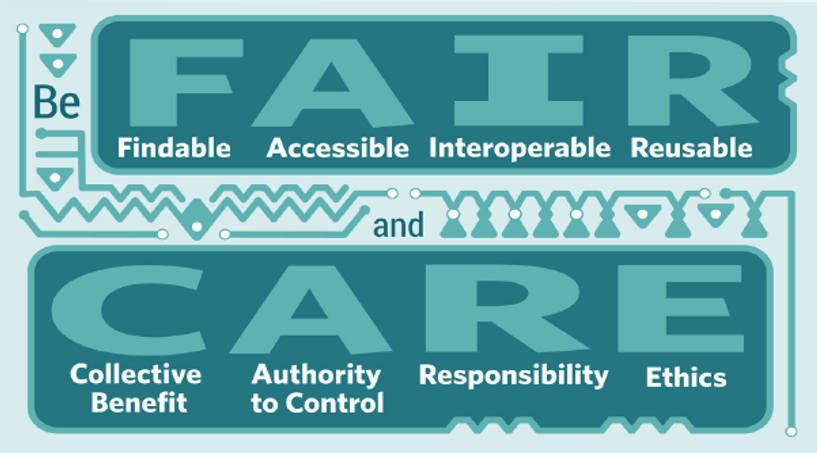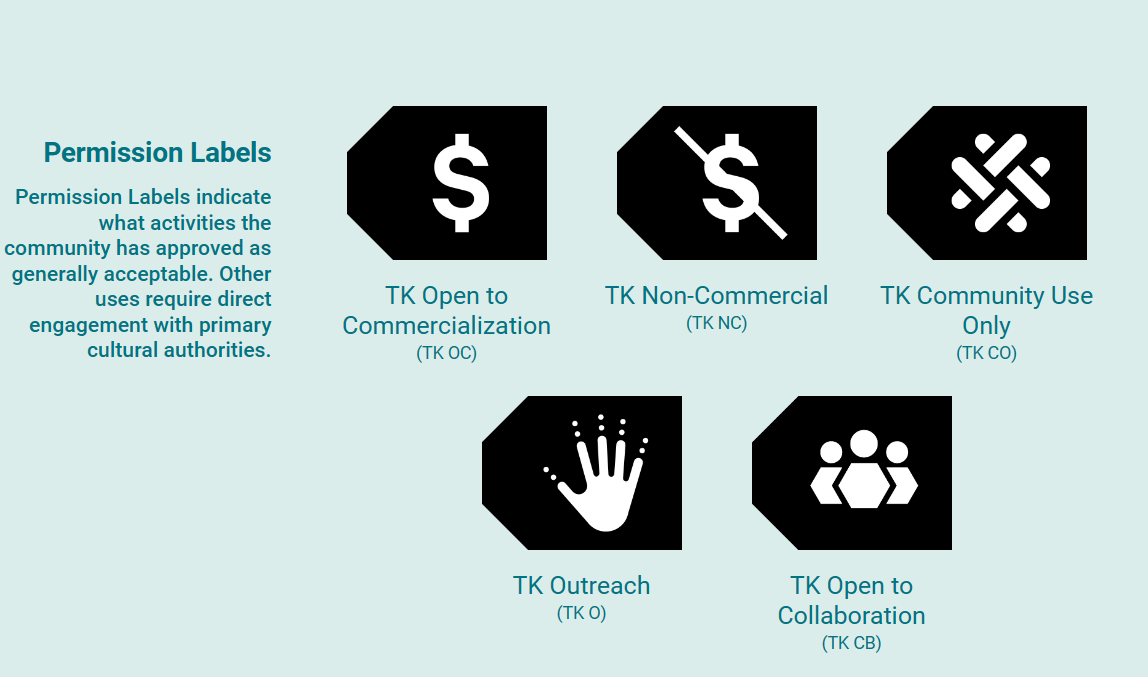Indigenous Data Resources
CIOOS is committed to working respectfully with Indigenous communities and their ocean data. As part of this commitment, CIOOS is striving to adhere to the First Nations Principles of OCAP, the CARE principles for Indigenous data governance, and the TRUST principles for data repositories. In addition to implementing best practices in Indigenous data management, CIOOS is also working to enable traditional knowledge and biocultural labeling through Local Contexts. These labels empower communities to determine how their data may be used. Together, these policies and tools support Indigenous communities to decide what is best for their data.
The First Nations Principles of OCAP asserts First Nations control over data collection processes in their communities, and that they own and control how this information can be stored, interpreted, used, or shared. It also reflects First Nations commitments to use and share information in a way that maximizes the benefit to the community, while minimizing harm. OCAP is a tool to support information governance for First Nations data sovereignty.
The First Nations Principles of OCAP include:
- Ownership: refers to the relationship of First Nations to their cultural knowledge, data, and information. This principle states that a community or group owns information collectively in the same way that an individual owns his or her personal information.
- Control: affirms that First Nations, their communities, and representative bodies are within their rights in seeking control over research and information management processes that impact them. First Nations control of research can include all stages of a particular research project-from start to finish. The principle extends to the control of resources and review processes, the planning process, information management, etc.
- Access: refers to the fact that First Nations must have access to information and data about themselves and their communities regardless of where it is held. The principle of access also refers to the right of First Nations’ communities and organizations to manage and make decisions regarding access to their collective information. This may be achieved, in practice, through standardized, formal protocols.
- Possession: While ownership identifies the relationship between a people and their information in principle, possession or stewardship is more concrete. It refers to the physical control of data. Possession is the mechanism by which ownership can be asserted and protected.
Note, OCAP is used specifically for First Nations, whereas CARE is applicable to all Indigenous data.
The International Indigenous Data Alliance, developed the CARE Principles for Indigenous Data Governance in consultation with Indigenous Peoples, academia, non-profit organizations, and governments. The CARE Principles are people and purpose-oriented, reflecting the crucial role in advancing Indigenous rights to control and access their data. These principles complement the FAIR Principles encouraging open data movements to consider both people and purpose. The goal is that stewards and other users of Indigenous data will ~be FAIR and CARE~.

The CARE data principles include:
- Collective benefit: Data ecosystems shall be designed and function in ways that enable Indigenous Peoples to derive benefit from the data.
- Authority to Control: Indigenous Peoples’ rights and interests in Indigenous data must be recognised and their authority to control such data be empowered. Indigenous data governance enables Indigenous Peoples and governing bodies to determine how Indigenous Peoples, as well as Indigenous lands, territories, resources, knowledge, and geographical indicators are represented and identified within data.
- Responsibility: Those working with Indigenous data have a responsibility to share how those data are used to support Indigenous Peoples’ self-determination and collective benefit. Accountability requires meaningful and openly available evidence of these efforts and the benefits accruing to Indigenous Peoples.
- Ethics: Indigenous Peoples’ rights and well being should be the primary concern at all stages of the data life cycle and across the data ecosystem.
The TRUST Principles are a set of guidelines to demonstrate the repository is trustworthy of appropriately managing the data they hold. The TRUST Principles provide a common framework to facilitate discussion and implementation of best practices in digital preservation.
The TRUST principles for digital repositories include:
- Transparency: to be transparent about specific repository services and data holdings that are verifiable by publicly accessible evidence.
- Responsibility: to be responsible for ensuring the authenticity and integrity of data holdings and for the reliability and persistence of its service.
- User Focus: To ensure that the data management norms and expectations of target user communities are met.
- Sustainability: To sustain services and preserve data holdings for the long-term.
- Technology: To provide infrastructure and capabilities to support secure, persistent and reliable services.
CIOOS is also working with Local Contexts, a global initiative that supports Indigenous communities with tools that can reassert cultural authority in heritage collections and data. Local Contexts adds cultural and historic context to datasets and reserves Indigenous authority to content in digital archives, libraries, and other data repositories. It does so using Labels and Notices, specified by Indigenous communities and/or institutions.
CIOOS works with Indigenous partners to ensure these core principles are reflected in our practices and data management practices, and will continue to adapt its policies to reflect the needs of communities.

Sources
Carroll, S. et al., (2020) The CARE Principles for Indigenous Data Governance. Data Science Journal, 19; XX, pp.1-12. doi.org/10.5334/dsj-2020-042
First Nations Information Governance Centre. (2022) The First Nations Principles of OCAP. fnigc.ca/wp-content/uploads/2022/10/OCAP_Brochure_20220927_web.pdf
Global Indigenous Data Alliance. (2023) CARE Principles for Indigenous Data Governance www.gida-global.org/care
Lin, D., Crabtree, J., Dillo, I., Jenkyns,R., et al. (2020) The TRUST Principles for digital repositories. Sci Data 7, 144. doi.org/10.1038/s41597-020-0486-7
Explore the following links for more CIOOS resources on this topic:
Proulx, M. (2020) Literature Review. Indigenous Traditional Ecological Knowledge and Ocean Observing: Exploring the Potential for Partnership in Atlantic Canada. CIOOS Atlantic TEK Literature Review.pdf
Proulx, M. et al., (2021) Indigenous Traditional Ecological Knowledge and Ocean Observing: A Review of Successful Partnerships. Frontiers in Marine Science, Vol 8. doi.org/10.3389/fmars.2021.703938

